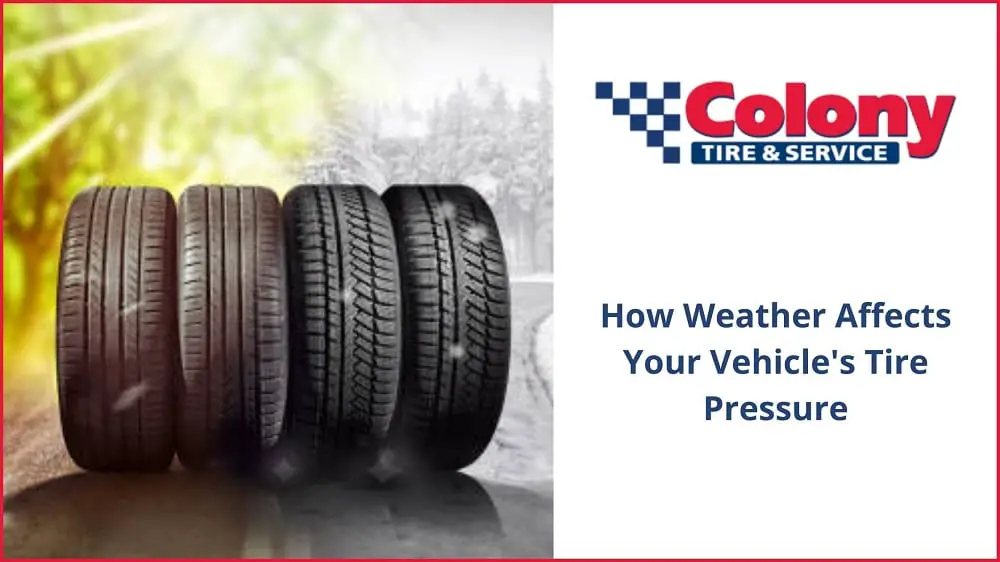The tires on a vehicle are not something many people typically give much thought to until they experience a flat tire or have some other problem with the tires. The fact is that tires are one of the essential parts of a vehicle and need to be appropriately maintained for your vehicle to continue to operate safely and smoothly.
Tire pressure is influenced by various factors like tire temperature, sun exposure, and fluctuation in weather conditions. Therefore, it is essential to regularly visit a tire shop, check their pressure, and take any required steps to maintain the tires in good working order.
Why does tire pressure change?
There are various reasons why your tire pressure changes. If you live in a city like Elizabeth City, NC, with major temperature fluctuations during different times of the year, this could increase or decrease tire pressure.
For example, your tire pressure would be different during the winter than in the summer. Significant changes in the weather during these times of the year hugely affect your tire's performance.
Tire stores like Colony Tire and Service can assist you with finding the right balance of tire pressure for your tires.
Relationship between PSI shifts as temperature changes
PSI (pound per square inch) is directly proportional to the temperature.
- Higher temperatures = higher pressure and overinflation
- Lower temperatures = lower pressure and underinflation
In other words, higher atmospheric temperatures will result in increased tire pressure. There is more heat energy for the molecules inside of the tire to use, which causes them to move faster. This increased energy causes the air molecules to take up more space, which leads to increased tire pressure.
Similarly, lower atmospheric temperatures will decrease tire pressure. This is because there is limited energy for molecules inside the tire, which causes them to move slower. This reduced energy causes the air molecules to take up less space, resulting in a lower tire pressure.
Weather Conditions and Tire Pressure
Temperature/Sunlight
Extreme temperature changes can influence your tire pressure. For example, the tires on a vehicle sitting in the sun will have a different tire pressure than the tires on a vehicle that has been sitting in the shade. If the vehicle is resting in the sun, it is advised to let the tires cool off before checking the pressure.
Sunlight causes the chemicals in a tire to expand, and therefore tire pressure increases during periods of bright sunlight. Thus, for drivers to get accurate pressure readings, they need to check their tire pressure when they are cold.
Humidity/Rain
When humidity levels are high, tire pressure will increase. This element causes the rubber in the tires to swell, which increases the internal air pressure inside the tire.
As for rain, it can also inflate the level of air pressure inside your tires, but only if the vehicle is sitting for an extended time, like during the night. If the vehicle has been running recently, the rain will not affect tire pressure.
If you want to buy tires for sale in Elizabeth City, NC, it can be found by searching for “tire shops near me.”
Wind
The wind plays a significant role when it comes to tire pressure. If the vehicle gets parked in an area where the wind blows directly on the vehicle, the tires may inflate. When wind speeds increase rapidly, air pressure decreases in a vehicle that has been closed up and parked in an area with high winds.
On the other hand, when there is no wind outside, the air pressure inside your tire will be very low if you are driving slowly. Therefore, if you drive faster than 30 MPH, it is unlikely that your tire pressure will change.
Winter
In winter, your tire pressure will decrease due to the cold temperatures. This is because tires lose pressure when exposed to extremely low or extremely high temperatures. In addition, if there is a large difference between the internal and external tire pressure, your tires will likely lose some of the air.
It happens once the vehicle sits for a long period, like overnight. If you plan to check your tire pressure in the winter, you need to make sure that your tires are warm before checking them. Otherwise, you may get an inaccurate reading on your tire pressure.
Bottom line
It is essential to check the tire pressure in your vehicle regularly, especially if you stay in an area that experiences varying temperatures. These weather conditions significantly affect your tires, which you should know about to maintain good performance and handling on the road.
Plan on checking your tire pressure in any of these extreme weather conditions. You should go to local tire shops like Colony tire and service in Elizabeth City to accurately read how much pressure your tires contain. This way, you won't have to worry about your tires suffering damage.






